Posts Tagged ‘Burma Partnership’ (399 found)
Documentary Film: “Guns, Briefcases and Inequality: The Neglected War in Kachin State”
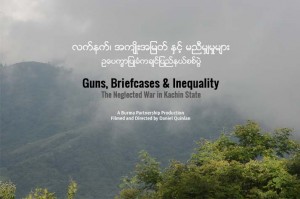 While President Thein Sein is being applauded internationally for his efforts to build peace in Burma, this new documentary film by Burma Partnership questions whether the government’s current process will really lead to sustainable peace and national reconciliation.
While President Thein Sein is being applauded internationally for his efforts to build peace in Burma, this new documentary film by Burma Partnership questions whether the government’s current process will really lead to sustainable peace and national reconciliation.
“Guns, Briefcases and Inequality: The Neglected War in Kachin State” highlights how development projects and natural resource management are exacerbating armed conflict and human rights violations in ethnic areas, without adequate means to justice for the people. The film demonstrates the need for the government of Burma to engage in meaningful political dialogue with all ethnic nationalities on equal terms to address the underlying causes of armed conflict: self-determination, the lack of ethnic rights, and inequality.
Whose Guns Are Silent?: An Analysis of Burma’s Fractured Peace Process
This paper is an analysis of the current situation with recommendations to the parties concerned. It is based on interviews with representatives of ethnic non-state armed groups (NSAGs), community-based organizations and civil society groups. On a state visit to the United Kingdom in July, President Thein Sein stated, “Very possibly, over the coming weeks, we will have a nationwide ceasefire and the guns will go silent everywhere in Myanmar for the first time in more than 60 years.” There is a significant gap in the pronouncements of the Thein Sein government and the realities of the ground situation in Burma’s ethnic areas: this paper seeks to explain that gap […]
• • •The Future Must be Federalism in Burma
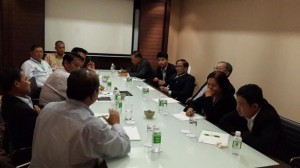 Preliminary peace talks between the alliance of ethnic non-state armed groups, the United Nationalities Federal Council (UNFC) and the Burma government in Chiang Mai, Thailand, over the weekend of 8-9 September resulted in little progress. Meanwhile the Burma Army is simultaneously reinforcing and strengthening its positions in Kachin State, resulting in more armed clashes and causing fear of another major offensive.
Preliminary peace talks between the alliance of ethnic non-state armed groups, the United Nationalities Federal Council (UNFC) and the Burma government in Chiang Mai, Thailand, over the weekend of 8-9 September resulted in little progress. Meanwhile the Burma Army is simultaneously reinforcing and strengthening its positions in Kachin State, resulting in more armed clashes and causing fear of another major offensive.
Led by Minister Aung Min, the Union Peace Working Committee invited the UNFC to Naypyidaw to sign a nationwide ceasefire accord despite there being no ceasefire agreement with the Kachin Independence Organization (KIO), a member of the UNFC. Given the increasing attacks on the Kachin and little tangible progress made in the peace process so far, the UNFC did not immediately accept the offer. The nationwide ceasefire accord signing is a major part of the government’s peace strategy and their plan is for international observers to be present, as well as domestic and international media. For the government, this very public show is important may be important to show the world that progress is being made, their peace plan is working and that perhaps more importantly, Burma is open for business […]
Burma Partnership to Launch Documentary Film: “Guns, Briefcases and Inequality: The Neglected War in Kachin State”
While President Thein Sein is being applauded internationally for his efforts to build peace in Burma, this new documentary film by Burma Partnership questions whether the government’s current process will really lead to sustainable peace and national reconciliation […]
• • •Burma’s Draft Association Law: A Smokescreen for Further Repression?
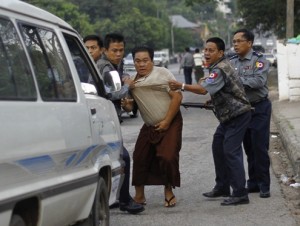 One of the main hopes for Burma’s recent political reforms has been for a vibrant, open and flourishing civil society – a vital component of any healthy democracy and an enabling environment for sustainable development. For Burma’s people to feel invested in its country’s political, economic and social development, they must be allowed to participate and they must be empowered. Yet participation and empowerment cannot happen if there are onerous or arbitrary restrictions on the right to freedom of association.
One of the main hopes for Burma’s recent political reforms has been for a vibrant, open and flourishing civil society – a vital component of any healthy democracy and an enabling environment for sustainable development. For Burma’s people to feel invested in its country’s political, economic and social development, they must be allowed to participate and they must be empowered. Yet participation and empowerment cannot happen if there are onerous or arbitrary restrictions on the right to freedom of association.
It was therefore disheartening to see the draft Association Law, published by the Public Affairs Management Committee on 27 July in a state-run newspaper. The draft law violated constitutional and international standards of free association, with international law permitting only limited and narrowly defined exceptions. It also flouted accepted international standards for laws on associations or not-for-profit organisations. The draft law made registration compulsory rather than voluntary, with unregistered associations prohibited from operating and facing disproportionate and draconian penalties of up to three years in prison as well as hefty fines for establishing or even participating in an unregistered association. In fact, the law would have needed to have been almost entirely redrafted to comply with international standards […]
Using the Law as a Weapon to Silence Legitimate Protestors
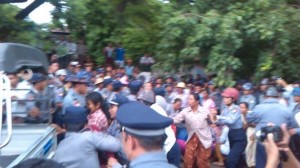 On 13 August, Naw Ohn Hla, a leading woman activist from Rangoon, gathered in Monywa, Sagaing Region, with over 50 local villagers to call for the suspension of the controversial Chinese-backed Letpadaung Copper Mine and to amend the 2008 Constitution. After a tense stand-off, police moved in to arrest Naw Ohn Hla and 9 other protest leaders, forcefully pulling them into the back of police trucks. Naw Ohn Hla was seized so violently that her clothing was partially pulled off. She and the other activists are currently being held in Monywa No. 1 police station.
On 13 August, Naw Ohn Hla, a leading woman activist from Rangoon, gathered in Monywa, Sagaing Region, with over 50 local villagers to call for the suspension of the controversial Chinese-backed Letpadaung Copper Mine and to amend the 2008 Constitution. After a tense stand-off, police moved in to arrest Naw Ohn Hla and 9 other protest leaders, forcefully pulling them into the back of police trucks. Naw Ohn Hla was seized so violently that her clothing was partially pulled off. She and the other activists are currently being held in Monywa No. 1 police station.
On 29 August, Naw Ohn Hla was found guilty of disturbing public tranquility under Section 505(b) of the Penal Code and sentenced to two years in prison with hard labor. Her lawyer said she boycotted the hearing because “she does not have faith in the judicial system.” Naw Ohn Hla remains to be tried under Section 18 of the Peaceful Assembly and Peaceful Procession Law for allegedly holding a protest without permission. She did in fact request official permission prior to the protest, but was refused […]
Burma Government Must Prevent Ongoing Communal and Religious Violence by Tackling Impunity
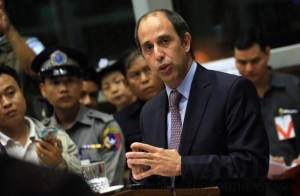 This week, United Nations Special Rapporteur on the situation of human rights in Burma, Tomás Ojea Quintana, reported that during his recent 10-day official mission to Burma his convoy was besieged by anti-Muslim protestors in Meikhtila, Mandalay Region, the scene of anti-Muslim violence in March of this year. However, the week’s unrest did not stop there: a few days later, Buddhist mobs burnt down dozens of shops and homes belonging to Muslims in Kantbalu, Sagaing Region, after a Muslim man was arrested for allegedly attempting to rape a Buddhist woman. Unfortunately, such incidents in Burma are nothing new: 2013 has seen outbreaks of religious and communal violence afflicting increasing numbers of towns across the country. Violence flared up most notably in Meikhtila on 20 March, lasting for more than a week, and also on 28 and 29 May in Lashio, Shan State, where one Muslim was killed and four Buddhists injured, and on 29 May in Mone, Kyauk Gyi Township, Pegu Region, where mobs destroyed a mosque and a madrasa. In addition, nearly 250,000 people, the majority of whom are Muslims, have been displaced by the violence across the country thus far […]
This week, United Nations Special Rapporteur on the situation of human rights in Burma, Tomás Ojea Quintana, reported that during his recent 10-day official mission to Burma his convoy was besieged by anti-Muslim protestors in Meikhtila, Mandalay Region, the scene of anti-Muslim violence in March of this year. However, the week’s unrest did not stop there: a few days later, Buddhist mobs burnt down dozens of shops and homes belonging to Muslims in Kantbalu, Sagaing Region, after a Muslim man was arrested for allegedly attempting to rape a Buddhist woman. Unfortunately, such incidents in Burma are nothing new: 2013 has seen outbreaks of religious and communal violence afflicting increasing numbers of towns across the country. Violence flared up most notably in Meikhtila on 20 March, lasting for more than a week, and also on 28 and 29 May in Lashio, Shan State, where one Muslim was killed and four Buddhists injured, and on 29 May in Mone, Kyauk Gyi Township, Pegu Region, where mobs destroyed a mosque and a madrasa. In addition, nearly 250,000 people, the majority of whom are Muslims, have been displaced by the violence across the country thus far […]
Statement of Endorsement for Declaration of 8888 Silver Jubilee
We are honored to let all our leaders, friends and supporters know that we have supported, contributed and fully participated in the three day commemoration of 25-year anniversary of the 1988 democracy uprising. We were able to have an open and healthy discussion on a variety of issues including national reconciliation […]
• • •The Fallen Heroes and Heroines of 8888 Must Be Honored With Accountability
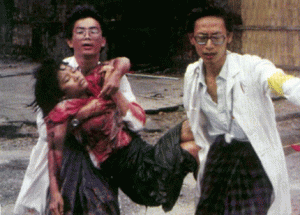 The week of 8888 Silver Jubilee has passed, with many commitments made for the future. Among the many commemorations of 8888 Silver Jubilee, this year Rangoon saw the largest public 8888 anniversary gathering in history with more than 4,000 activists from 88 generation forces and politicians from across the country, border areas and exile, leaders of ethnic armed groups, political parties, farmers, workers, and civil society representatives from different areas of the country as well as from exile attending the ceremony. After two days of open and lively discussions and deliberations on this special event initiated by 88 Generation Peace and Open Society and organized by various 88 generation and young generation activist groups, a crowd of 20,000 people quickly filled up the hall in the morning of 8 August and spilled out into the entrance of the hall to watch the event on a live television screen. Everyone remembers and, for the new generation, wants to remember the historical movement for democracy 25 years ago and the military regime’s brutal crackdown on countrywide mass demonstrations that killed as many as 3,000 peaceful protesters […]
The week of 8888 Silver Jubilee has passed, with many commitments made for the future. Among the many commemorations of 8888 Silver Jubilee, this year Rangoon saw the largest public 8888 anniversary gathering in history with more than 4,000 activists from 88 generation forces and politicians from across the country, border areas and exile, leaders of ethnic armed groups, political parties, farmers, workers, and civil society representatives from different areas of the country as well as from exile attending the ceremony. After two days of open and lively discussions and deliberations on this special event initiated by 88 Generation Peace and Open Society and organized by various 88 generation and young generation activist groups, a crowd of 20,000 people quickly filled up the hall in the morning of 8 August and spilled out into the entrance of the hall to watch the event on a live television screen. Everyone remembers and, for the new generation, wants to remember the historical movement for democracy 25 years ago and the military regime’s brutal crackdown on countrywide mass demonstrations that killed as many as 3,000 peaceful protesters […]
25 Years On, Freedom of Association Remains an Illusion
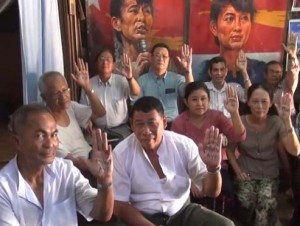 On 27 July, the Public Affairs Management Committee published the draft Association Law with a notice calling for comments and recommendations. The 9 August deadline to send comments allows so little time for recommendations that it makes it almost meaningless. Civil society organizations quickly reacted to the draft bill by publishing a statement endorsed by 87 organizations. The statement rejects the draft law and calls for any discussion in the Parliament to be suspended in order to allow sufficient time for broad and meaningful consultations.
On 27 July, the Public Affairs Management Committee published the draft Association Law with a notice calling for comments and recommendations. The 9 August deadline to send comments allows so little time for recommendations that it makes it almost meaningless. Civil society organizations quickly reacted to the draft bill by publishing a statement endorsed by 87 organizations. The statement rejects the draft law and calls for any discussion in the Parliament to be suspended in order to allow sufficient time for broad and meaningful consultations.
Similarly the Myanmar National Human Rights Commission (MNHRC) draft law was published on 7 July following similar proceedings. Again, the draft law was immediately tabled in the Parliament, limiting time for consultations and recommendations by civil society organizations.
The draft Association Law violates people’s right to freedom of association. The law must be almost entirely redrafted if it is to comply with international legal standards. In its current form it serves no other purpose than perpetuating government’s control over civil society […]
• • •








 All posts
All posts